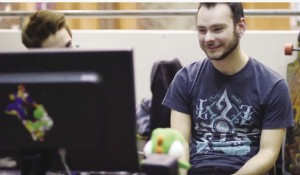Brothers of Smash
Looking at MRU’s Competitive Super Smash Bros. scene
Bigoa Machar, Arts Editor
It’s 7:13 P.M. on a Tuesday night. Old-style tube TVs grace the tops of the tables on Wyckham House’s second floor. Dozens of people sprawl out all staring intensely at these screens, furiously mashing away on their Gamecube controllers. As more people enter the room, they’re greeted with smiles and laughs from their friends. Every so often, someone shouts “Hey, this set up is free, who else is in the bracket?” While a room full of people playing video games may not seem like much on the surface, MRU’s Super Smash Bros. club is more than just a place where people go to play video games. It’s a place where like-minded gamers can make friends and have a good time.
In addition to meeting new people, the club serves as a fantastic way to earn a ticket to the pro ranks. While professional video games may sound strange out of context, electronic sports, or eSports, have been paying out big time since the early 2000s. These tournaments offer hundreds of thousands of dollars every year, with really good players earning their living off participating.
Kurt Robertson, the organizer of MRU’s Super Smash Bros. club, says that this club gives students an opportunity they may have not had before.

Players gather in Wyckham house every Tuesday night to throw down in Super Smash Bros. | Photo by Bigoa Machar
“For the longest time we had a casual scene, so having that casual scene of players never gave us the opportunity to be known for what Smash is known for. What we have here now is straight up tournament players and players who want to try out. We have mostly a competitive scene with people that want to get out and that want to travel to larger tournaments like Evo and things like that.”
Robertson also says that he is proud of the fact that this club remains a to be a special opportunity for MRU students in particular.
“What’s unique about here is that we have all MRU students. They get to come here [and] open up to a wider branch of the community.”
While the competitive scene may seem a little intimidating at the time, Robertson stresses that it’s something that everyone can get into.
“One of the hardest things about playing this game from a social standpoint is learning how to deal with losses and other players that take the game very seriously,” Robertson explains. “Let’s say you’re brand new and you just beat someone and they end up being really angry. We call that being salty. If someone is being really salty, then it’s hard to tell if they don’t like you or things like that, but I think that just comes from a competitive standpoint. The respect factor also comes into play here. If you’re not that good, then some of the top players won’t talk to you and you won’t make any strides in the community. A lot of that comes from shyness as well. I may not be the best player, but people in the community still know me for running stuff like this,” Robertson says.
While the club takes pride in being a small circle where everyone can meet everyone, Robertson says that he hopes the club can still grow and give this opportunity to more and more MRU students.
“I would love to see it grow more. We have a few setups here, but I’d love to take this entire room. I want a big group of people come together who like the game and want to get better. Anyone who wants to be a part of the community is welcome here,” Rovertson says. Currently, the meetups at the U of C are really, really big, so it’s nice to have kind of a smaller meetup setting of players here. Having 20-30 people a week here is nice because you get to meet all of the people here and get a better taste of the community rather than competitive brackets by themselves. You get to talk to people when the groups are like this and that’s kind of what I want MRU to stay as.”



